Garden Maintenance in Frankston North
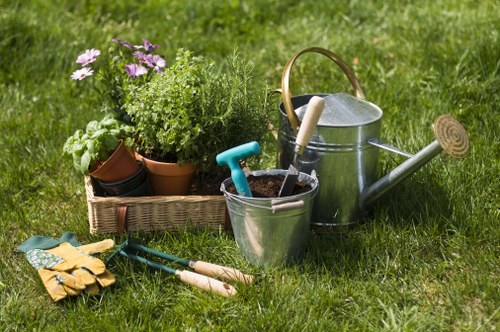
Introduction to Garden Maintenance
Maintaining a beautiful garden requires dedication, knowledge, and the right tools. In Frankston North, residents take pride in their outdoor spaces, transforming them into lush retreats that enhance the beauty of their homes and the community.
Proper garden maintenance not only boosts the aesthetic appeal of your property but also contributes to the overall health of your plants and environment. Whether you're a seasoned gardener or a beginner, understanding the essentials of garden care is crucial for achieving vibrant and thriving greenery.
This comprehensive guide explores the key aspects of garden maintenance in Frankston North, providing valuable tips and insights to help you cultivate a stunning garden all year round.
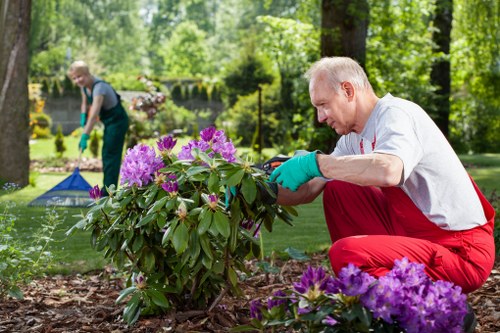
Essential Garden Maintenance Tasks
1. Regular Mowing and Lawn Care
A well-maintained lawn serves as the foundation of any garden. In Frankston North, the climate supports a variety of grass types, each requiring specific care routines.
- Mowing: Regular mowing encourages healthy grass growth. Aim to mow at least once a week during the growing season.
- Watering: Proper watering schedules ensure that grass receives adequate moisture without becoming waterlogged.
- Fertilizing: Applying fertilizers enriches the soil, promoting strong and green lawns.
2. Pruning and Trimming
Pruning is essential for maintaining the shape and health of your plants. It involves removing dead or overgrown branches to encourage new growth and prevent disease.
- Timing: The best time to prune most plants is during the dormant season, typically in late winter or early spring.
- Tools: Use sharp, clean tools to make precise cuts and minimize damage to the plant.
- Technique: Focus on removing no more than 25% of a plant's foliage at one time to avoid stressing it.
3. Weed Control
Weeds compete with your garden plants for nutrients, light, and water. Effective weed control is essential for maintaining a healthy garden.
- Manual Removal: Hand-pulling weeds is effective, especially for smaller gardens.
- Mulching: Applying mulch suppresses weed growth by blocking sunlight and retaining soil moisture.
- Chemical Treatments: Use herbicides sparingly and follow safety guidelines to prevent damage to desirable plants.
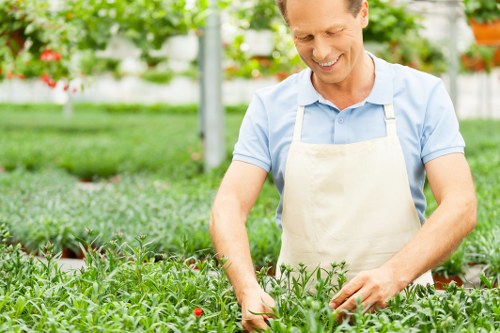
Seasonal Garden Maintenance Tips
Spring Maintenance
Spring is the time for renewal and preparing your garden for the active growing season. Key tasks include:
- Soil Testing: Assess soil health and pH levels to determine necessary amendments.
- Planting: Sow seeds and transplant seedlings for a vibrant spring bloom.
- Pest Control: Inspect plants for signs of pests and take preventive measures.
Summer Care
Summer brings intense heat and sun, requiring diligent garden maintenance to keep plants thriving.
- Watering: Ensure consistent watering, preferably in the early morning or late evening.
- Mulching: Replenish mulch to retain soil moisture and regulate temperature.
- Deadheading: Remove spent flowers to encourage continuous blooming.
Autumn Cleanup
Autumn is the perfect time to prepare your garden for the winter months. Key activities include:
- Leaf Removal: Clear fallen leaves to prevent mold and disease.
- Plant Protection: Shield vulnerable plants from frost and harsh weather.
- Tool Maintenance: Clean and store garden tools properly to extend their lifespan.
Winter Preparation
While plants may be dormant, winter maintenance ensures your garden remains healthy and ready for the next growing season.
- Pruning: Finalize pruning tasks to shape plants and remove any remaining dead growth.
- Soil Care: Add compost or manure to enrich the soil for spring planting.
- Planning: Designate areas for new plantings and plan your garden layout.
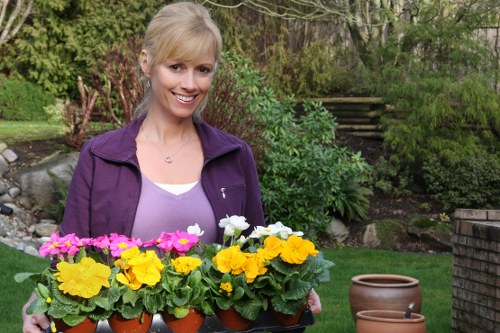
Choosing the Right Plants for Frankston North
The climate in Frankston North is conducive to a diverse range of plants. Selecting the right species ensures that your garden remains healthy and vibrant.
Native Plants
Native plants are adapted to the local environment, making them resilient and low-maintenance options for your garden.
- Kangaroo Paw: Known for their distinctive flowers, these plants are drought-tolerant and attract pollinators.
- Grevillea: Versatile shrubs that come in various colors and sizes, ideal for adding structure.
- Eucalyptus: Tall trees that provide shade and have aromatic foliage.
Ornamental Plants
Ornamental plants add aesthetic value through their flowers, foliage, and unique shapes.
- Roses: Classic and beloved, roses offer a range of colors and fragrances.
- Lavender: Fragrant and attractive, lavender is perfect for borders and herb gardens.
- Succulents: Ideal for low-water gardens, succulents come in diverse forms and colors.
Vegetable and Herb Gardens
Growing your own vegetables and herbs can be both rewarding and practical.
- Tomatoes: A staple in many gardens, they require ample sunlight and regular watering.
- Basil: An aromatic herb that thrives in warm conditions.
- Carrots: Root vegetables that benefit from loose, well-drained soil.
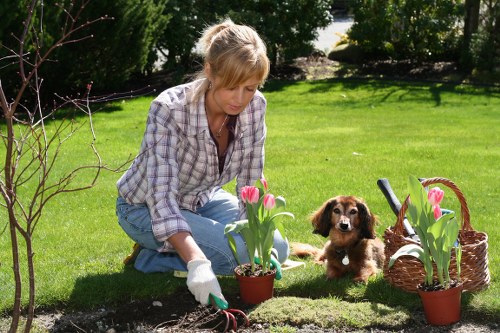
Local Services and Support in Frankston North
Access to quality garden maintenance services can make a significant difference in the health and appearance of your garden. Frankston North offers a range of professional services tailored to meet diverse gardening needs.
Professional Gardeners
Experienced gardeners in Frankston North provide comprehensive services, including:
- Landscape Design: Creating customized garden layouts that align with your vision.
- Maintenance Plans: Regular upkeep services to ensure your garden remains pristine.
- Plant Care: Expert advice on plant selection, planting, and ongoing care.
Local Nurseries and Suppliers
Local nurseries offer a wide selection of plants, tools, and supplies essential for garden maintenance.
- Plant Variety: Access to native and exotic plants suited to Frankston North’s climate.
- Gardening Tools: Quality tools and equipment to facilitate garden care tasks.
- Advice and Support: Knowledgeable staff to guide you in making informed gardening decisions.
Community Resources
Frankston North boasts a vibrant community of gardening enthusiasts and resources.
- Workshops: Educational sessions on various gardening topics and techniques.
- Gardening Clubs: Opportunities to connect with fellow gardeners and share experiences.
- Public Gardens: Beautiful spaces to inspire your own garden designs.
10-15 Closest Areas to Frankston North
Frankston North is surrounded by several neighboring areas, each offering unique features and proximity that are relevant to gardening services. Here are the 10-15 closest areas:
- Frankston South: Just south of Frankston North, known for its community parks and residential gardens.
- Chelsea: A nearby suburb with a mix of homes and local gardening centers.
- Mornington: Renowned for its botanical gardens and vibrant plant nurseries.
- Half Moon Bay: Coastal area offering unique maritime plants and garden designs.
- Seaford: Known for its well-maintained public gardens and green spaces.
- Mount Eliza: Features larger estates with extensive garden maintenance needs.
- Langwarrin: A blend of residential and rural gardens requiring diverse maintenance services.
- Rosebud: Offers a variety of ornamental plants suitable for both small and large gardens.
- Skye: Smaller suburb with personalized garden care services.
- Mornington Peninsula: Expansive area with diverse horticultural opportunities.
- Frankston: Central area with access to numerous gardening suppliers and experts.
- Mornington South: Close to Frankston North, featuring community gardens and local plant shops.
- The Baxter: Offers unique garden layouts and specialized plant care services.
- Seaford South: Known for its landscaped gardens and professional maintenance providers.
- Langwarrin North: Adjacent to Langwarrin, providing additional gardening service options.
Benefits of Professional Garden Maintenance
Investing in professional garden maintenance services in Frankston North offers numerous advantages, ensuring your garden remains a source of pride and relaxation.
- Expert Knowledge: Professionals bring extensive experience and knowledge to handle various gardening challenges.
- Time-Saving: Outsourcing maintenance frees up your time to enjoy your garden without the hassle of upkeep.
- Customized Care: Tailored maintenance plans address the specific needs of your garden, enhancing its overall health and appearance.
- Increased Property Value: A well-maintained garden can significantly boost your property's market value.
- Environmental Benefits: Professionals implement sustainable practices that promote eco-friendly gardening.
Eco-Friendly Practices
Adopting sustainable gardening practices not only benefits your garden but also the environment. Consider the following eco-friendly tips:
- Composting: Recycle organic waste to create nutrient-rich compost for your plants.
- Rainwater Harvesting: Collect rainwater to reduce reliance on municipal water sources.
- Native Plant Selection: Use native species that require less water and are more resistant to local pests.
- Organic Fertilizers: Choose natural fertilizers to avoid harmful chemical runoff.
Implementing a Garden Maintenance Schedule
Creating a structured maintenance schedule ensures that your garden receives consistent care throughout the year.
Monthly Tasks
- Inspect Plants: Check for signs of pests, diseases, and nutrient deficiencies.
- Weed Control: Remove weeds regularly to prevent them from overtaking your garden.
- Pruning: Trim overgrown branches and shape plants as needed.
Seasonal Tasks
- Spring: Focus on planting, soil preparation, and fertilizing.
- Summer: Prioritize watering, mulching, and deadheading.
- Autumn: Concentrate on leaf removal, plant protection, and tool maintenance.
- Winter: Engage in pruning, soil enrichment, and garden planning.
Yearly Tasks
- Soil Testing: Conduct comprehensive soil tests to adjust pH and nutrient levels.
- Landscape Redesign: Refresh your garden layout to incorporate new plants and design elements.
- Tool Replacement: Replace worn-out tools to maintain efficiency and effectiveness.
Common Garden Problems and Solutions
Pest Management
Pests can damage your plants and disrupt the balance of your garden. Effective pest management strategies include:
- Integrated Pest Management (IPM): Combine biological, cultural, and chemical methods for eco-friendly control.
- Natural Predators: Encourage beneficial insects like ladybugs and spiders that prey on pests.
- Barriers: Use physical barriers such as nets and row covers to protect plants from pests.
Disease Prevention
Plant diseases can spread quickly if not addressed promptly. Preventive measures include:
- Proper Spacing: Ensure adequate air circulation to reduce the risk of fungal infections.
- Sanitation: Remove and dispose of diseased plant material to prevent spread.
- Resistant Varieties: Choose disease-resistant plant species to minimize vulnerability.
Soil Health
Healthy soil is the cornerstone of a thriving garden. Maintain soil health by:
- Amending: Add organic matter such as compost to improve soil structure and fertility.
- Crop Rotation: Rotate plant families to prevent soil depletion and reduce pest buildup.
- Cover Cropping: Plant cover crops during off-seasons to protect and enrich the soil.
Advanced Gardening Techniques
For those looking to elevate their gardening practices, consider incorporating advanced techniques that enhance plant growth and garden sustainability.
Vertical Gardening
Vertical gardening maximizes space by growing plants upwards, making it ideal for smaller gardens or those looking to add visual interest.
- Trellises and Arbors: Support climbing plants like vines and flowers.
- Wall Planters: Utilize walls for mounting planter boxes or pocket systems.
- Hanging Baskets: Create dynamic displays with a variety of hanging plants.
Hydroponics
Hydroponics is a soil-less growing method that uses nutrient-rich water to cultivate plants. Benefits include:
- Space Efficiency: Ideal for urban gardens and indoor setups.
- Faster Growth: Plants often grow quicker in hydroponic systems.
- Water Conservation: Uses less water compared to traditional gardening.
Companion Planting
Companion planting involves growing compatible plants together to enhance growth, deter pests, and improve yield.
- Benefits: Increased biodiversity, natural pest control, and healthier plants.
- Examples: Tomatoes and basil, carrots and onions, marigolds with various vegetables.
Technology in Garden Maintenance
Modern technology offers innovative solutions to streamline garden maintenance and improve plant care.
Smart Irrigation Systems
Smart irrigation systems automate watering schedules based on weather conditions and soil moisture levels.
- Water Efficiency: Reduces water waste by delivering precise amounts as needed.
- Convenience: Manage watering remotely through smartphone apps.
- Customization: Tailor schedules to specific plant requirements.
Garden Management Apps
Garden management apps assist in planning, tracking, and optimizing garden care activities.
- Plant Identification: Identify plants and receive care instructions.
- Scheduling: Set reminders for watering, fertilizing, and pruning.
- Data Tracking: Monitor growth patterns and environmental conditions.
Drones and Sensors
Advanced tools like drones and sensors provide valuable data for large-scale garden maintenance.
- Aerial Monitoring: Assess plant health and landscape features from above.
- Soil Sensors: Measure moisture, pH, and nutrient levels in real-time.
- Automated Reporting: Generate detailed reports for informed decision-making.
DIY Garden Maintenance Tips
For those who prefer a hands-on approach, here are some practical DIY tips to maintain your garden effectively.
Hand Tools Maintenance
Keeping your garden tools in good condition ensures efficiency and longevity.
- Cleaning: Remove dirt and debris after each use.
- Sharpening: Regularly sharpen blades to maintain cutting precision.
- Storage: Store tools in a dry, organized space to prevent rust and damage.
Composting at Home
Creating a compost pile recycles organic waste into valuable soil amendments.
- Materials: Use kitchen scraps, leaves, and grass clippings.
- Balance: Maintain a balance of green (nitrogen-rich) and brown (carbon-rich) materials.
- Maintenance: Turn the pile regularly to aerate and speed up decomposition.
Natural Pest Repellents
Employ natural methods to keep pests at bay without harming your plants.
- Neem Oil: A natural pesticide effective against a variety of insects.
- Garlic Spray: Acts as a repellent for many common garden pests.
- Diatomaceous Earth: A fine powder that damages the exoskeletons of insects.
Rain Gardens
Rain gardens manage stormwater runoff and support diverse plant life.
- Location: Choose a low-lying area to collect rainwater.
- Plant Selection: Use moisture-loving plants that can thrive in temporary waterlogged conditions.
- Soil Preparation: Amend soil to improve drainage and nutrient content.
Maintaining Garden Paths and Structures
Pathways, fences, and garden structures play a vital role in the functionality and aesthetics of your garden.
Pathway Maintenance
Well-maintained pathways enhance accessibility and complement your garden’s design.
- Weed Control: Regularly remove weeds to keep paths clean and safe.
- Repairs: Fix cracks and uneven sections promptly to prevent tripping hazards.
- Lighting: Install garden lights to illuminate paths and add charm during evenings.
Fence and Structure Care
Fences and garden structures like pergolas and gazebos require ongoing maintenance to ensure durability and beauty.
- Painting and Staining: Protect wood structures from weathering by applying protective coatings.
- Inspection: Regularly check for and repair any structural damage.
- Cleaning: Keep structures free from dirt and debris to maintain their appearance.
Garden Furniture
Garden furniture adds comfort and style, making your outdoor space more inviting.
- Cleaning: Wipe down furniture to remove dirt and prevent mold growth.
- Protection: Use covers or store furniture during harsh weather to extend its lifespan.
- Arrangement: Organize furniture to create functional and aesthetically pleasing spaces.
Maximizing Garden Sustainability
Adopting sustainable practices in your garden contributes to environmental health and resource conservation.
Water Conservation
Efficient water use is essential for sustainable gardening.
- Drip Irrigation: Deliver water directly to plant roots, minimizing evaporation and waste.
- Rainwater Harvesting: Collect and store rainwater for garden use.
- Watering Times: Water plants during early morning or late evening to reduce evaporation.
Organic Gardening
Emphasizing natural methods promotes a healthy ecosystem and reduces chemical usage.
- Natural Fertilizers: Use compost, manure, and organic mulches to nourish plants.
- Pest Control: Implement biological and cultural methods to manage pests.
- Soil Health: Enhance soil fertility and structure through organic practices.
Biodiversity
Encouraging a variety of plants and organisms fosters a resilient and thriving garden.
- Plant Diversity: Incorporate a mix of native and ornamental plants to support different wildlife.
- Habitat Creation: Provide shelters and resources for pollinators, birds, and beneficial insects.
- Pollinator Gardens: Designate areas specifically to attract bees, butterflies, and other pollinators.
Conclusion
Effective garden maintenance in Frankston North blends knowledge, dedication, and sustainable practices. By implementing the tips and strategies outlined in this guide, you can cultivate a garden that not only looks stunning but also contributes positively to the environment.
Whether you choose to maintain your garden yourself or enlist the help of professional services, consistent care and attention will ensure your outdoor space remains a source of joy and relaxation for years to come.
Call to Action
Ready to transform your garden into a thriving oasis? Contact us today to book your garden maintenance service in Frankston North and experience the difference professional care can make!
